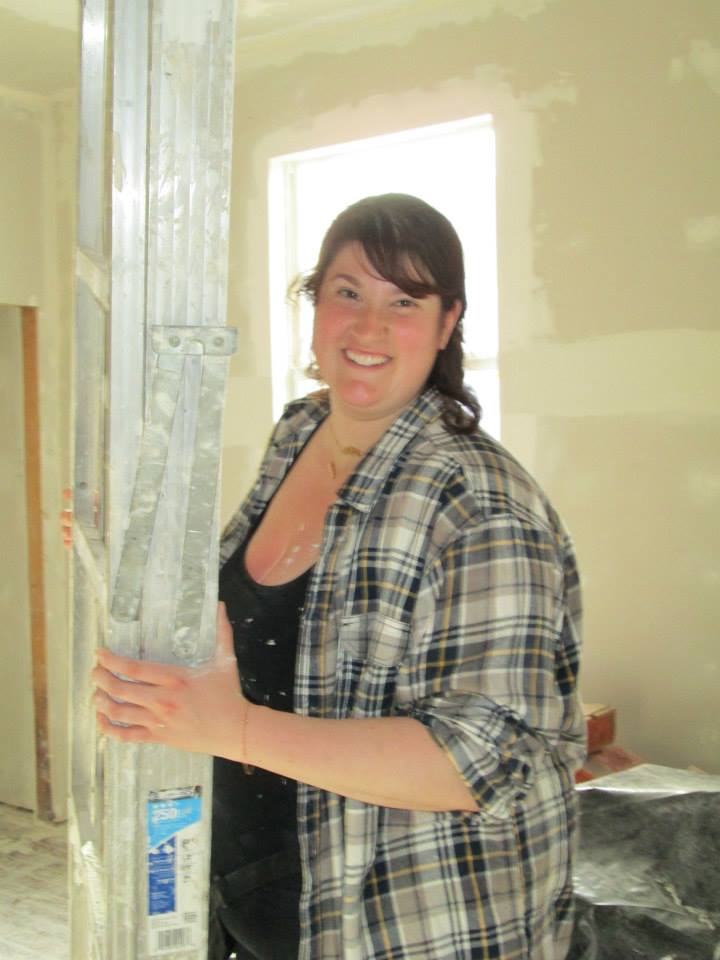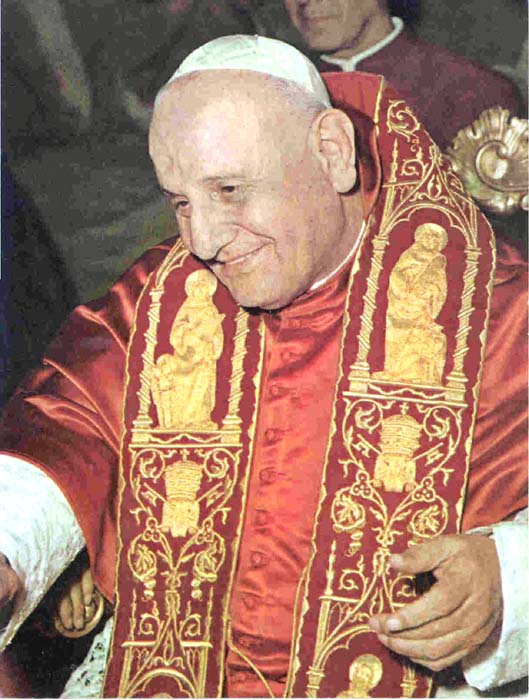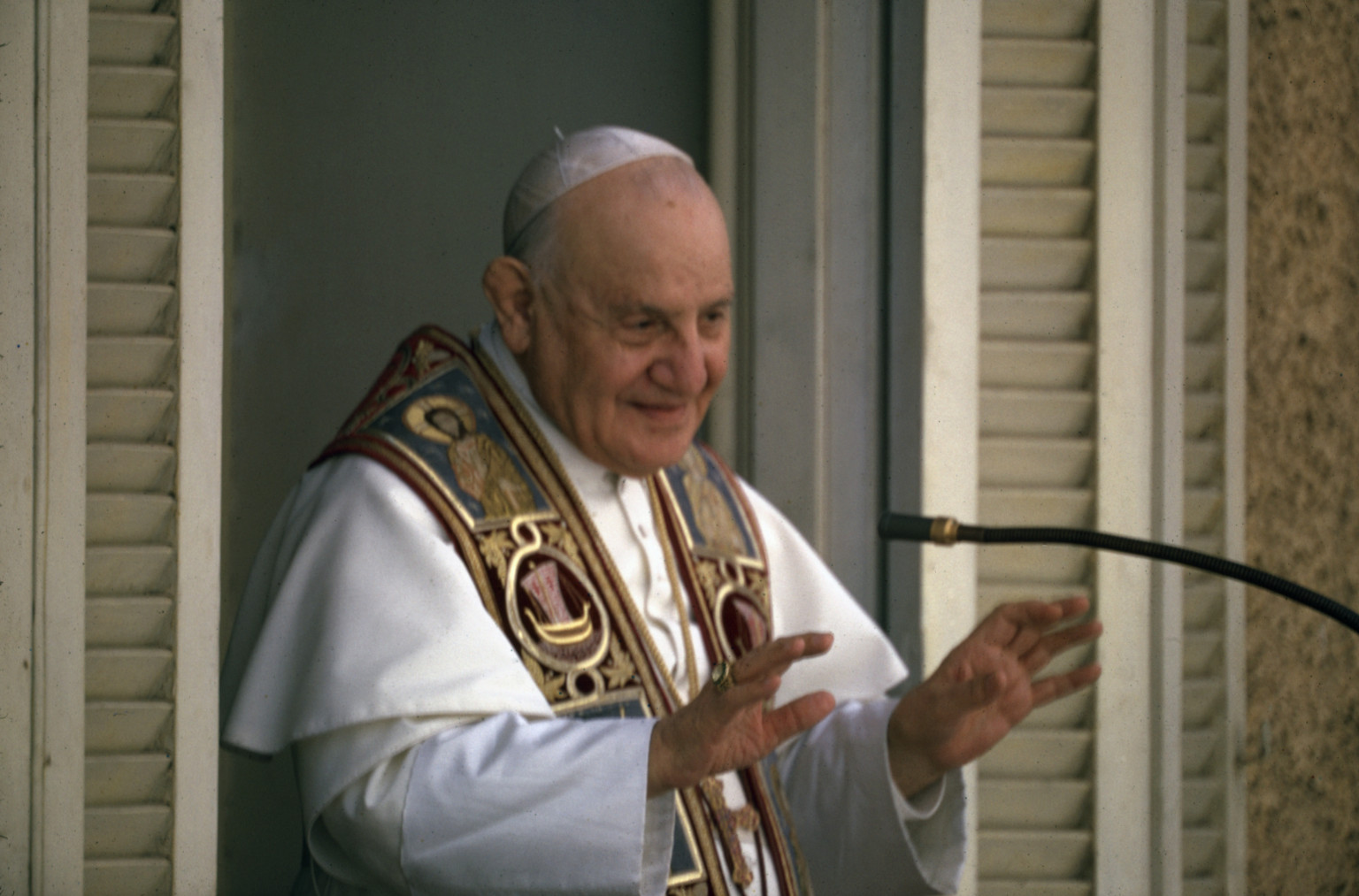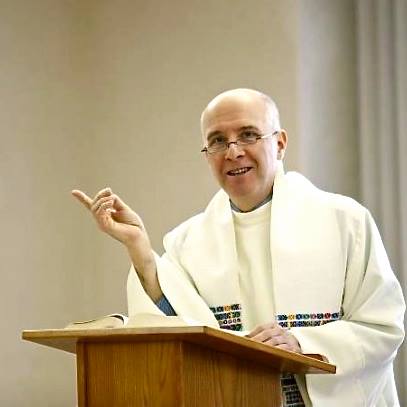Something to feast about
 In 1985, I turned on a local PBS television station one evening while I was nursing my first baby and my husband was doing an evening shift as a hospital pharmacist. A documentary about a nun from Calcutta was just beginning and so, with my little son nestling and eating, I began to watch the film about Mother Teresa of Calcutta. A member of the Congregation of Holy Cross, Fr. Jim Tobin whom I knew from my Sunday evening parish Mass gig on Cape Cod had worked with her in India and had a few good stories about her and her troupe of nuns but beyond that, I really didn't know much.
In 1985, I turned on a local PBS television station one evening while I was nursing my first baby and my husband was doing an evening shift as a hospital pharmacist. A documentary about a nun from Calcutta was just beginning and so, with my little son nestling and eating, I began to watch the film about Mother Teresa of Calcutta. A member of the Congregation of Holy Cross, Fr. Jim Tobin whom I knew from my Sunday evening parish Mass gig on Cape Cod had worked with her in India and had a few good stories about her and her troupe of nuns but beyond that, I really didn't know much.
When the credits rolled at the end of the film, I realized that I knew the creator of the documentary. Fr. William Petrie, a Sacred Heart father had also worked with Mother Teresa in India. Fr. Bill and his sisters, Jeanette and Ann Petrie, the latter a former Emmy award winning writer/producer took five years to film the documentary on Mother Teresa. We really are many parts and all connected to one another.
We had begun to hear of Mother Teresa and her work a bit in the news but after I saw the documentary, I was hooked on her. She was so unpretentious. Whether she was talking to a person with no clothes in a gutter or giving a speech at the United Nations, she was just herself. When our bishop, Sean O'Malley invited Mother Teresa's congregation, the Missionaries of Charity to open a house in New Bedford in 1995, Mother Teresa showed up to see her sisters and meet the people in the poorest neighborhoods of the city. By that time, another friend (yes, MB, that would be you) had roped me into doing some work for the sisters and the superior of the house gave me a 'ticket' to reserve a seat in the church across the street that would host a Mass and reception for this now Nobel Prize winning celebrity. I gave my reserved ticket away and read about the event in the local newspaper. People were swarming for a glimpse of Mother Teresa - where were they when you needed them to roll up their sleeves and do the dirty work? I didn't feel as though I needed to see this world class figure in person. I felt that I already knew her. We were doing God's work in our own ways.
I continued for awhile to be involved in Mother Teresa's new apostalate as much as time allowed. Now we had three children who I dragged during some really beautiful summer weather on many an 'excursion' to get some of that work done. I honestly don't remember my children complaining about being schleped along through some pretty interesting experiences. There was one exception: the day that I invited over 40 children under the age of 12 who the sisters were working with that summer to our home for a 'fun' day of some pool time with some good food and room to run around in a place where there actually trees and out of the heart and heat of the tenements and housing developments where these children lived, some in extreme poverty with little or no behavior modification. It's one thing to go to work as an educator, social worker, health care provider, minister and anyone who works with the public and experience the dire circumstances of people you serve, but when you take another step and invite them into your home and have them turn it topsy turvey --- well, I think that my own three kids buried my halo in a hole under the pine trees that day. We had to literally put Humpty Dumpty back together again. We have a good chuckle over some of their sad sack faces in some of the pictures I took that day, a memorable one.
We're never alone
At the time, I was a pastoral musician in a sizable parish with a music department of approximately 200 volunteers that included four choirs, two instrumental ensembles, a fleet of cantors, a librarian (bless you, Leanne) and the usual staff meetings, councils, diocesan events, rehearsals, etc. that accompany this position. Simultaneously, I was teaching Pre-K - 9 music in the school that my children attended and retained my evening Mass on the Cape, and yes, I did bring my kids quite often but we did find a way to have fun quite often during those excursions.) By this time, there wasn't much time for volunteering with the Missionaries of Charity but did go whenever they called and learned that I had to say 'no' when I just couldn't meet their needs because of time restraints and priorities. (Try to say 'no' to a Missionary of Charity; they don't hear that word well.)
By this time, the sisters were involved in several apostolates. One of them was the House of Correction in our region. In November, the sisters happened to worship in the parish where I served. The superior of the house approached me after Mass and asked if I would go with them on Christmas Eve to provide music for the inmates. "You're not doing anything on Christmas Eve," she said. Several people who were standing with us gasped. I attempted to explain how things worked in parish life.
"Sister, I don't think that you understand just how busy Christmas Eve and Christmas Day can be in a parish," I explained. "I leave my home and my family at 11:00am to set up everything up. People begin to arrive at 2:00 pm for a 4:00 pm vigil liturgy. The bishop's diocesan television Mass is taped in this parish at 4:00pm. There's a concert before Mass with choir and orchestra. Then we get ready for the 6:00 pm Mass, again a full church. I run home around 8:00 pm to kiss my children and husband and come back to set up again at 10:00 pm for the concert at 11:00 pm before Midnight Mass, again with full choir and orchestra with a full church. There are three liturgies tomorrow morning. When would you like me to go to the prison?" I really thought she'd back off.
"Well then, find another time to go. It's your duty." And she wasn't kidding.
A few days of fuming (and praying) turned me around. She was right: visiting the imprisoned is a directive from Jesus. How would I do this? Who could help me? Saints anywhere, in heaven and on earth, is anyone listening? Show me the way. You doers and givers and holy ones of God who preceded me --- help!
The inner voice. "Just do it."
I contacted a friend who worked for the Sheriff's office as an administrator. A strong Catholic who just 'got it,' Bob invited me to bring the adult choir and ensemble to the prison to provide music for Bishop O'Malley's liturgy, which he initiated for the House of Correction. I began to sweat a bit when I realized that I had commmitted my musicians to provide music for inmates without talking to them first. When I raised the issue, some were afraid, others negative and still others intrigued. But in the end, everyone agreed that we should go. By the end of the experience, the entire choir and ensemble wanted to know if we could return the following year, they were so moved. And we did, for a many years after that first time. The experience was mutually profound for both inmates and choir members. The reminder of my Christian duty opened up a shining new moment of grace, linking saint to saint, sinner to sinner. "Who are we to judge?" Pope Francis reminds us. Indeed.
Something to feast about
In my mind, today's feast of All Saints refers to not only the great and the good who have been canonized but reminds us that we all have a duty to be saints, to love God here and now, create God's reign here and now before we're received into heaven. That's something to feast about.
In Fr. Petrie's documentary on Mother Teresa, she's asked, "Some people have called you a saint. Do you think you're a saint?" She doesn't hesitate for a moment. "Well yes, of course, that's the call of the Christian, do be holy, to be a saint, to be who God has and called you to be." Go, MT. In plain English, be yourself. Or, as Elizabeth Gilbert well writes, "God lives in me - as me."
Happy Feast of All Saints. May they continue to prompt us, guide us and accompany us as we weave our way through this life to the next.
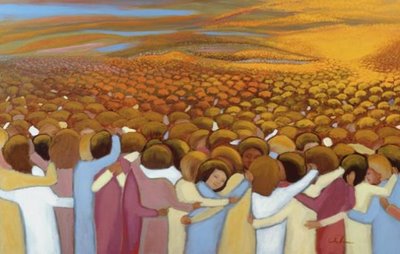 For All the Saints Who've Shown Your Love by John L. Bell
For All the Saints Who've Shown Your Love by John L. Bell
For all the saints who've shown your love
in how they live and where they move,
for mindful women, caring men,
accept our gratitude again.
For all the saints who've loved your name,
whose faith increased the Savior's fame,
who sang your songs and shared your word,
accept our gratitude, Good Lord.
For all the saitns who named your will
and show the kingdom coming still
through selfless prtest, prayer and praise,
accept the gratitude we raise.
Bless all whose will or name or love
reflects the grace of heaven above.
Though unaccliamed by earthly powers,
your life through theirs has hallowed ours.
 Denise Morency Gannon
Denise Morency Gannon